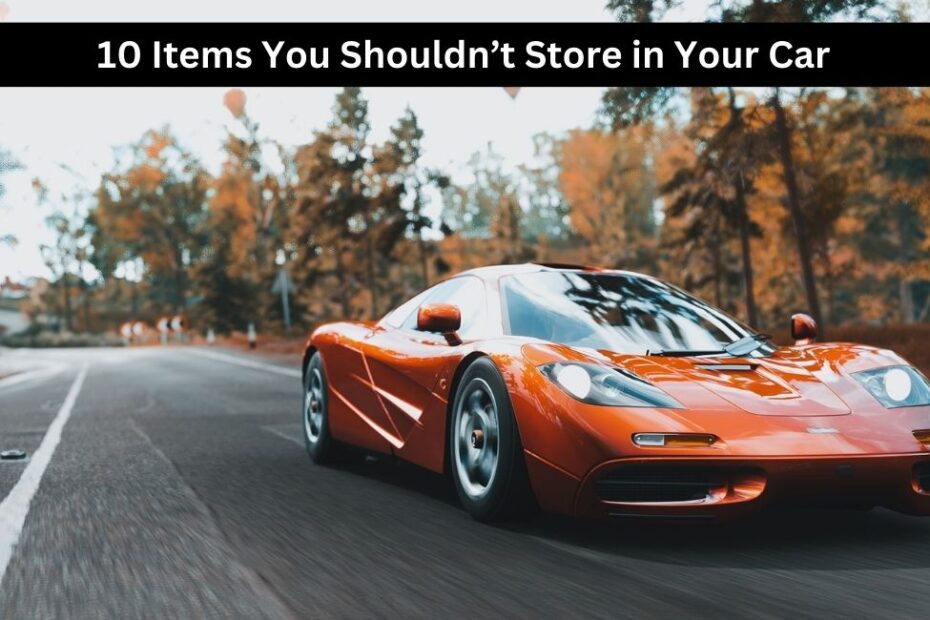Our cars often serve as an extension of our homes, carrying not only us but also a variety of items we might need on the go. While it’s convenient to keep essentials in your vehicle, there are certain items that should never find a permanent home in your car. From safety concerns to potential damage, storing certain things in your car can lead to unintended consequences. In this article, we’ll explore 10 items you should avoid storing in your car to ensure both safety and the longevity of your vehicle.
10 Items You Shouldn’t Store In Your Car
1. Electronics
Electronic devices, especially those with lithium-ion batteries, should not be left in your car. Exposure to extreme temperatures, whether it’s scorching heat or freezing cold, can damage the batteries, reducing their lifespan and potentially causing them to leak or explode. This includes items like laptops, smartphones, and power banks.
2. Medications
While it’s common to keep a first aid kit in your car, certain medications should be kept at room temperature. Extreme heat or cold can alter the chemical composition of medications, rendering them ineffective or even harmful. It’s advisable to carry a separate, portable container for medications and only keep what’s necessary for immediate needs in your car.
3. Fragile Items
Glass containers, delicate ornaments, or anything breakable should be avoided in your car. Sudden stops, sharp turns, or even a minor collision can turn your vehicle into a hazard for fragile items. If you must transport fragile items, secure them properly and place them in a way that minimizes the risk of breakage.
4. Food and Perishables
Leaving perishable items in your car, especially in warm weather, can lead to spoilage and the growth of bacteria. Dairy products, fruits, and even certain non-perishables can be negatively affected by temperature extremes. If you plan to transport groceries, try to make it a priority to get them home and into the appropriate storage conditions as soon as possible.
5. Valuables
Leaving valuables like wallets, jewelry, or expensive electronics in plain sight is an invitation for theft. Even if you think your neighborhood is safe, it’s better to err on the side of caution. Store valuable items in the trunk or out of sight to reduce the risk of your car becoming a target for theft.
6. Aerosol Cans
Aerosol cans are pressurized and can explode when exposed to high temperatures. Leaving them in your car, especially on a hot day, can lead to a dangerous situation. If the canister ruptures, it may not only damage your car but also pose a significant safety risk.
7. Pets
Leaving pets unattended in a car, even for a short period, can be extremely dangerous. Temperatures inside a parked car can rise rapidly, leading to heatstroke and even death for pets. It’s essential to prioritize the safety and well-being of your furry friends by never leaving them alone in the car.
8. Important Documents
Documents like your passport, social security card, or any sensitive information should not be stored in your car. In case of theft, you risk identity theft and the loss of crucial documents that may be challenging to replace. Keep such items secure at home and carry them with you when necessary.
9. Flammable Materials
Storing flammable items like gasoline containers, propane tanks, or even certain cleaning supplies in your car is a recipe for disaster. Exposure to heat or a minor accident can lead to a fire or explosion. Always transport such materials in a well-ventilated area, preferably in a separate, secure container.
10. Water Bottles
Surprisingly, leaving water bottles in your car can pose risks. When exposed to high temperatures, plastic bottles may release harmful chemicals into the water. It’s advisable to take your water bottles with you or choose a reusable, temperature-resistant alternative.
While our cars often serve as a convenient storage space, it’s crucial to be mindful of what we keep in them. Avoiding the storage of certain items can contribute to the safety of your vehicle, protect your belongings, and ensure a comfortable and secure driving experience. By being selective about what you leave in your car, you’ll not only extend the life of your vehicle but also minimize potential risks and hazards.
